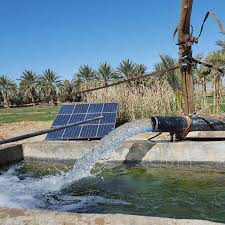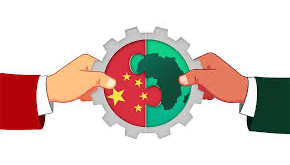Published: November 29,2022

Winifred Nzioka’s face lit up when a male farmhand delivered several jerrycans of water to her homestead on a balmy late afternoon to quench the thirst of mooing cows.
The middle-aged mother of five has put up a permanent house sandwiched between sunbaked farms at the heart of the southern Kenyan county of Machakos, which is in the grip of a prolonged dry spell. A few yards from Nzioka’s homestead is a public school where a solar-powered borehole sponsored by a Chinese entrepreneur is providing respite to water stress that used to torment residents of the arid plains that dot Machakos County.
The small-holder farmer told Xinhua during a recent interview that water woes are now behind her since she can draw the commodity from the solar-powered borehole at a modest fee. “I have benefitted a lot from the borehole where I obtain water for my cows and domestic consumption. We are happy because clean drinking water is now on our doorstep,” said Nzioka.
Completed in around May, the solar-powered borehole at Kwakatheke Primary School, adjacent to Nzioka’shome, is the brainchild of Li Xia, the chief executive officer and co-founder of Shenzhen Solar Run Energy Company Limited. Through a partnership with local not-for-profit groups, Li has leveraged solar solutions to address water stress in Machakos and other Kenya’s drylands bearing the brunt of climate-induced droughts. Li, who had just landed from Egypt where she attended the UN climate conference, said harnessing solar power to pump water from boreholes is helping tackle the growing scarcity of the resource in Africa’s climate hotspots.
Fabian Daniel, an 18-year-old farmhand, was in his element as he chaperoned two heifers that carted away 20-liter jerrycans filled with water drawn from a kiosk fed by the solar-powered borehole. “We used to trek for about five kilometers and spend upwards of two hours to reach a water source, but it is no longer the case; now we are obtaining the commodity at this kiosk which is on our doorstep,” said Daniel. The young son of peasant farmers said he currently spends less than thirty minutes drawing water from the kiosk and carting it home for domestic consumption and irrigating crops. “I think this water project is good for rural Kenyans affected by drought. We have to look for a way to make water available for these communities, including drilling boreholes.
Underground water is more reliable than rain,” said Li. She noted that solar power, a renewable source of energy, could aid Kenya’s quest for a green transition besides enhancing sustainable water supply for underserved rural communities.
Li stressed that access to a reliable water supply will enable Machakos villagers to undertake climate-resilient agricultural practices, boost their food security and broaden their revenue streams. “Water is not only helping them to drink, but also helping them to increase productivity in their farms. And solar power is a must; because in off-grid areas, you cannot draw water from underground sources without solar energy,” said Li. Li said courtesy of a strategic partnership with local enterprises and charities, her company has been able to utilize China’s prowess in underground water utilization to tackle access gaps in Kenya’s arid and semi-arid areas.
More than five million liters of clean drinking water has been delivered to households since the completion of the solar-powered borehole project and the kiosk in May this year, said Tajinder Singh, managing director of Project Maji, a not-for-profit social enterprise that has partnered with Li to tackle water woes in Kenya. Singh added that the public primary school is provided with one thousand liters of safe drinking water daily to help quench pupils’ thirst, irrigate trees and improve sanitation and hygiene. Singh disclosed that one 20-liter jerrycan of water is sold at 2.5 Kenyan shillings (about 0.02 U.S. dollars) at the kiosk, adding that regular monitoring is conducted to ensure the commodity meets the safety and quality threshold. Susan Kennedy, principal of Kwakatheke Primary School, said the establishment of a solar-powered borehole has improved the academic performance and health of her 107 pupils. “The children have been spared the agony of trekking long distances under scorching heat to look for water. The borehole water is safe for drinking and children are also using it to nurture trees and maintain the hygiene of their classrooms,” said Kennedy.
Xinhua
 Africa -China Review Africa -China Cooperation and Transformation
Africa -China Review Africa -China Cooperation and Transformation
